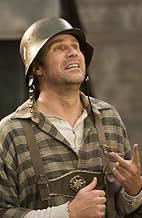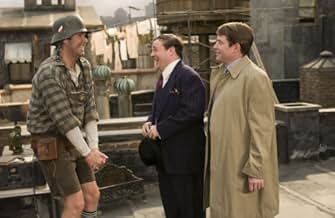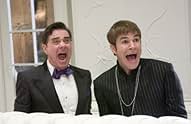CALIFICACIÓN DE IMDb
6.4/10
46 k
TU CALIFICACIÓN
Tras otro fiasco en Broadway, el desafortunado productor Max Bialystock se une al tímido contable Leo Bloom en una treta para hacerse ricos rápidamente montando el peor espectáculo del mundo... Leer todoTras otro fiasco en Broadway, el desafortunado productor Max Bialystock se une al tímido contable Leo Bloom en una treta para hacerse ricos rápidamente montando el peor espectáculo del mundo.Tras otro fiasco en Broadway, el desafortunado productor Max Bialystock se une al tímido contable Leo Bloom en una treta para hacerse ricos rápidamente montando el peor espectáculo del mundo.
- Dirección
- Guionistas
- Elenco
- Premios
- 1 premio ganado y 17 nominaciones en total
Opiniones destacadas
A little more music and embellishing of several plot points that were passed over in the original film are what distinguishes this musical version of The Producers. It's a musical version about a film that had a plot about two men who try to create the biggest flop in the history of Broadway and a musical.
Taking the places of Zero Mostel and Gene Wilder as the producing partners Bialystock&Bloom are Nathan Lane and Matthew Broderick. Both these guys are given an impossible task of repeating two classically congruent performances that Mostel and Wilder created. Even the additional bits of business just can't make me forget the original.
Will Ferrall did not come over from Broadway to do the role of the hermit like Nazi living in Greenwich Village and caring for his carrier pigeons. He had to do double duty because he also took the place of beatnik method actor Dick Shawn from the original. I'm not sure that combining the roles was the best thing, I'm also not sure Ferrall did real justice to either try as he might on both. Kenneth Mars was the reclusive Nazi author of Springtime For Hitler. in the original. Both he and Shawn were almost as memorable as Mostel and Wilder.
I do love the Mel Brooks humor, but I think he laid it on a bit thick with the gay stereotyping of Gary Beach and Roger Bart. It came this close to the good side of being offensive, but not quite.
There's a lot to like in this version of The Producers, but I think Mel should not have touched his masterpiece.
Taking the places of Zero Mostel and Gene Wilder as the producing partners Bialystock&Bloom are Nathan Lane and Matthew Broderick. Both these guys are given an impossible task of repeating two classically congruent performances that Mostel and Wilder created. Even the additional bits of business just can't make me forget the original.
Will Ferrall did not come over from Broadway to do the role of the hermit like Nazi living in Greenwich Village and caring for his carrier pigeons. He had to do double duty because he also took the place of beatnik method actor Dick Shawn from the original. I'm not sure that combining the roles was the best thing, I'm also not sure Ferrall did real justice to either try as he might on both. Kenneth Mars was the reclusive Nazi author of Springtime For Hitler. in the original. Both he and Shawn were almost as memorable as Mostel and Wilder.
I do love the Mel Brooks humor, but I think he laid it on a bit thick with the gay stereotyping of Gary Beach and Roger Bart. It came this close to the good side of being offensive, but not quite.
There's a lot to like in this version of The Producers, but I think Mel should not have touched his masterpiece.
This is the third incarnation of the story of The Producers, where two producers attempt to put a giant flop on Broadway then take all the money and run away, and this one is the one that works least well. That doesn't mean it's bad, it's like saying that someone is the dumbest of the Nobel Prize winning Physicists. The story is VERY good, and a great set up for some incredibly entertaining characters and situations.
This version is based on the multi-award-winning Broadway musical, which was based on the original movie starring Zero Mostel and Gene Wilder. Replacing them in the roles of Max Bialystock and Leo Bloom are Nathan Lane and Matthew Broderick, who are reprising their roles on stage. Also in the cast are Uma Thurman as Ulla, Will Ferrell as Nazi playwright Franz Lebkind, and Gary Beach and Roger Bart as "common-law partners" Rodger DeBris and Carmen Ghia. There are also several cameos peppering the movie, including Deborah Monk, Andrea Martin, John Lovitz, Michael McKean, Thomas Meehan, and even Mel Brooks. All the performances are very good overall, despite some snags here and there. Thurman seems to pop in and out of accent and Broderick takes some time to warm up to what turns out to be his best performance since "Ferris Buller's Day Off". The standout performance was Roger Bart, who is having a banner year now that he has finished his role of the insane pharmacist on TV's Desperate Housewives. Bart easily steals every scene that he's in, which is no small feat considering the list of talent in this film. Lane, as usual, proves that he is a dynamo of energy that, fortunately, can be guided and utilized to produce amazing things. He easily carries this film.
The entire look of the film is very stylized. And that stylization is, unfortunately, very stagey. This is director Susan Strohman's first film, and it shows that up until now she has worked exclusively in theatre. Much of the movie lacks interesting camera work--the characters are in the center, framed nicely, while they perform their play. There is also a good deal of talking directly to the camera. This is certainly not the first movie that has done this. It's not even the first time that Matthew Broderick has done this (see "Ferris Buller's Day Off"). At first it is a little distracting, but Strohman is smart in that she realizes that this is the style of the piece, and she sticks to it throughout the entire film. Indeed, the first and last people we see are talking directly to the camera (Stick around after the credits, by the way). The way that the film is staged also makes it seem stagey. There are many jokes and bits of scenery moving that are more fitting for a stage than a screen.
I don't mean to make this sound like a bad thing, after all, who says that movies must follow such strict guidelines? I enjoyed the film greatly, and there were many things about it that I think other directors could learn from (especially directors of movie-musicals). The main thing that this movie achieves over other musicals, "Chicago" or "Rent" for example, is that Strohman allows us to watch the performers perform the musical numbers. They're NOT over-edited like the other two musicals I mentioned. It was a remembrance of the golden days of movie musicals where shots lasted forever, and we actually got to see the actors dance. Make no mistake about it, Strohman is an AMAZING choreographer. The numbers "I Wanna Be A Producer" and "That Face" show that she really does rank up there with the great choreographers of movie and Broadway history.
Many people ask why film this version? It's not as good as the original, and it works better on stage than on film. The answer seems to be that a $10 movie ticket is cheaper than a $100 theatre ticket, and now a wider audience gets to see the great performances. And they should. Despite the movie's flaws, it is incredibly funny.
This version is based on the multi-award-winning Broadway musical, which was based on the original movie starring Zero Mostel and Gene Wilder. Replacing them in the roles of Max Bialystock and Leo Bloom are Nathan Lane and Matthew Broderick, who are reprising their roles on stage. Also in the cast are Uma Thurman as Ulla, Will Ferrell as Nazi playwright Franz Lebkind, and Gary Beach and Roger Bart as "common-law partners" Rodger DeBris and Carmen Ghia. There are also several cameos peppering the movie, including Deborah Monk, Andrea Martin, John Lovitz, Michael McKean, Thomas Meehan, and even Mel Brooks. All the performances are very good overall, despite some snags here and there. Thurman seems to pop in and out of accent and Broderick takes some time to warm up to what turns out to be his best performance since "Ferris Buller's Day Off". The standout performance was Roger Bart, who is having a banner year now that he has finished his role of the insane pharmacist on TV's Desperate Housewives. Bart easily steals every scene that he's in, which is no small feat considering the list of talent in this film. Lane, as usual, proves that he is a dynamo of energy that, fortunately, can be guided and utilized to produce amazing things. He easily carries this film.
The entire look of the film is very stylized. And that stylization is, unfortunately, very stagey. This is director Susan Strohman's first film, and it shows that up until now she has worked exclusively in theatre. Much of the movie lacks interesting camera work--the characters are in the center, framed nicely, while they perform their play. There is also a good deal of talking directly to the camera. This is certainly not the first movie that has done this. It's not even the first time that Matthew Broderick has done this (see "Ferris Buller's Day Off"). At first it is a little distracting, but Strohman is smart in that she realizes that this is the style of the piece, and she sticks to it throughout the entire film. Indeed, the first and last people we see are talking directly to the camera (Stick around after the credits, by the way). The way that the film is staged also makes it seem stagey. There are many jokes and bits of scenery moving that are more fitting for a stage than a screen.
I don't mean to make this sound like a bad thing, after all, who says that movies must follow such strict guidelines? I enjoyed the film greatly, and there were many things about it that I think other directors could learn from (especially directors of movie-musicals). The main thing that this movie achieves over other musicals, "Chicago" or "Rent" for example, is that Strohman allows us to watch the performers perform the musical numbers. They're NOT over-edited like the other two musicals I mentioned. It was a remembrance of the golden days of movie musicals where shots lasted forever, and we actually got to see the actors dance. Make no mistake about it, Strohman is an AMAZING choreographer. The numbers "I Wanna Be A Producer" and "That Face" show that she really does rank up there with the great choreographers of movie and Broadway history.
Many people ask why film this version? It's not as good as the original, and it works better on stage than on film. The answer seems to be that a $10 movie ticket is cheaper than a $100 theatre ticket, and now a wider audience gets to see the great performances. And they should. Despite the movie's flaws, it is incredibly funny.
First, there was Mel Brooks' clever movie "The Producers." That got adapted into a Tony-winning stage musical. Then the musical became adapted into a movie. This hilarious spectacle is sure to please! Nathan Lane and Matthew Broderick return as Max Bialystock and Leo Bloom, the same roles they made famous on Broadway. Lane is a riot, channeling Zero Mostel's bombastic character. Meanwhile, Broderick surprises as he does a decent take on Gene Wilder's original hysterical act. Will Ferrell scores laughs as Nazi playwright Franz Liebkind, and Uma Thurman puts in a good song and dance as Swedish sexpot Ulla. The movie perfectly catches the style of the old-fashioned musical, with a large serving of slapstick. This snappy production is sure to be a hit with everyone!
One has to compare this with the original and it just does not cut it. Lane is pretty good in this but have seen him much, much better. I like Broderick usually but this performance is embarrassing. Will Ferrell is his usual overrated self-there is not a funny bone in his body!! Uma Thurman is wasted in this .I have been told that the stage play is great, so perhaps a straight filming of the Broadway production might have been a better idea (after all Into the Woods worked brilliantly as a simple filming of the stage). Incidentally I love musicals so that was not my problem. The original film was just so great and the performances by Mostel,Wilder and Mars were incredible and incredibly funny that any remake just had to suffer by comparison. The only way in which the new version might have shaded it were the stage numbers which looked great. A nice try but they shot and they missed.
What a fantastic surprise. I've seen Luke-warm reviews about this film, largely saying that the theatrical basis (the Broadway show) is oh-so-evident. Well, in my opinion, this is one of the film's strengths. It's a well-intentioned performance and is close enough to the original Producers, and so unlike it, that the musical remake is justified.
I love musicals, especially musical comedy. This film is a sop to the musical comedy, with good performances from the leads, and Uma Thurman and Will Ferrell, who all appear to be enjoying themselves.
The central (staged) number "Springtime for Hitler" is brilliantly choreographed, with suitably outrageous costumes. Gary Beach as a brilliantly camp Hitler completes this excellent scene. And the bratwurst!! The editing in this sequence - camera panning to the gob-smacked audience is brilliant. This is a film that salutes and spoofs musicals. It's an absolute delight
I love musicals, especially musical comedy. This film is a sop to the musical comedy, with good performances from the leads, and Uma Thurman and Will Ferrell, who all appear to be enjoying themselves.
The central (staged) number "Springtime for Hitler" is brilliantly choreographed, with suitably outrageous costumes. Gary Beach as a brilliantly camp Hitler completes this excellent scene. And the bratwurst!! The editing in this sequence - camera panning to the gob-smacked audience is brilliant. This is a film that salutes and spoofs musicals. It's an absolute delight
¿Sabías que…?
- TriviaAfter Max (Nathan Lane) and Leo (Matthew Broderick) do Der Guten Tag Hop Clop with Franz (Will Ferrell), Max tries to pull open the door. When it doesn't open, he shouts, "We're trapped!" This is an inside joke from the play's run in England. One night, a stage hand had locked the door. When Nathan Lane tried it, he realized it was locked and shouted out, "We're trapped! Trapped like rats with a crazy Nazi!" A stage hand then went up and unlocked the door and they got out.
- ErroresThe older male dancer who says "Don't be stupid, be a schmarty..." is speaking with Mel Brooks' voice on his first appearance. The next time he is heard delivering a line, he has a completely different, deep voice. However, this is deliberate: the character also lip syncs to Mel Brooks' recorded voice in the stage production.
- Citas
Max Bialystock: We got the wrong play, the wrong director, the wrong cast. Where did we go right?
- Créditos curiososFor the closing credits, Will Ferrell (in the character of Franz Liebkind) recorded "The Hop-Clop Goes On" - a slower version of "Der Guten Tag Hop-Clop" that parodies "My Heart Will Go On" from "Titanic" right down to the cheesy instrumentals. At the end of the song, Franz whispers to the audience: "Don't forget to purchase 'Mein Kampf' in paperback. You can find it at Borders... or Barnes and Noble...und Amazon.com"
- ConexionesEdited into The Spoils (2024)
- Bandas sonorasThere's Nothing Like a Show on Broadway
Music and Lyrics by Mel Brooks
Performed by Nathan Lane and Matthew Broderick
Selecciones populares
Inicia sesión para calificar y agrega a la lista de videos para obtener recomendaciones personalizadas
Detalles
- Fecha de lanzamiento
- País de origen
- Idiomas
- También se conoce como
- The Producers
- Locaciones de filmación
- Productoras
- Ver más créditos de la compañía en IMDbPro
Taquilla
- Presupuesto
- USD 45,000,000 (estimado)
- Total en EE. UU. y Canadá
- USD 19,398,532
- Fin de semana de estreno en EE. UU. y Canadá
- USD 154,590
- 18 dic 2005
- Total a nivel mundial
- USD 38,075,318
- Tiempo de ejecución2 horas 14 minutos
- Color
- Mezcla de sonido
- Relación de aspecto
- 2.39 : 1
Contribuir a esta página
Sugiere una edición o agrega el contenido que falta






































